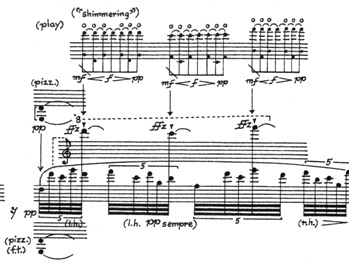There are two performances that I have seen that have unexpectedly changed my life. And tonight’s selections actually capture both of them.
I have many recordings of the Beethoven String Quartets. They may be my favorite body of work … ever. Beethoven is often thought of first and foremost as a symphonist (and for good reason, don’t get me wrong). The quartets are a different beast though. Intimate, close and extremely personal. He took this instrumentation (already standardized by the earlier Viennese classical tradition with Haydn and Mozart) and greatly added weight to its repertoire. I have MANY recordings of the quartets (5 or 6 I think?) so I will talk about them a great deal over the course of this project, but since this is the first set I am transferring, I’ll start with a story about the first time I heard one of them.
My junior year of high school, a quartet visited Roseville High School and performed the Op. 59 #1 and Op. 59 #3 quartets in the school library. I was not in the least bit interested in hearing them. In fact I wasn’t that into classical music at all. My main contact with classical music had come from the concert band repertoire that we played in band during the non-marching band season. Holst and Vaughn Williams were OK, and I did really like a band arrangement we performed of Bach’s ‘Little Fugue’ in g minor. Anyways – I wasn’t interested in hearing any string quartets, much less an hour of them. But – we had to go.
I had no idea people could play like this. The opening cello melody in Op. 59 #1, the independent melodic lines that seem to fight around each other only to come together into large chords… and … and I didn’t know! What was I hearing? I ran to work that day and found a cassette of Op. 59 #1 (the little Roseville Tower didn’t have #3) and on that tape was also a recording of the Grosse Fuge which I was excited about since I liked the Bach fugue we played in band so much. Wow – was I in for a shock. This wasn’t anything like the Bach fugue, and I couldn’t believe how intense the music was. I didn’t realize it at the time, but hearing that group play was what got me interested in listening to (then trying to understand and finally wanting to perform and compose) classical music. The Op. 59 quartets are still some of my favorite. The recording from tonight is from the 70s (if I remember correctly) with the Quator Vegh. Some very nice performances (relaxed for the most part), but the recording is a bit boomy in the cello, and thin in the violins. Like I said though – much more about Beethoven quartets in the future (especially about the differences in performance).
The second performance that would greatly change my life occurred in Copenhagen (during my first trip to Europe). Bassoonist Külli Sass (now Lambertsen) had contacted me about performing my ‘Music for Bassoon and Computer’, and I was able to pull together funds to make it out for the concert during the conservatory’s new music festival. Külli was an amazing performer, and we had a great couple days rehearsing. The night of the concert though featured a performance of George Crumb’s ‘Vox Balanae’. I had heard this piece once before and enjoyed it, but seeing it performed (masks, blue lights and amplified) was thrilling. Even more thrilling was watching the performers. They paid SUCH close attention to each other and played together in a way that I hadn’t ever seen students other students do. After the concert I wrote to Külli and asked if she would be interested in having a new piece, and also wondered if the performers from the Crumb piece and another player who had performed a solo bass piece may also be interested. They all said yes and we figured out a way to put the piece together. The piece became my doctoral dissertation ‘Organon Sostenuto’ for flute (Tanja Backe), cello (Pia Enblom), bassoon (Külli), double bass (Kristján Orri Sigurleifsson) and computer (myself). We performed the piece in Copenhagen a year after my first trip out, then they all came to Seattle a few months later for my doctoral recital. One of the main ideas behind the piece was a lack of information in the score about how melodic parts were supposed to line up – the performers needed to pull this aspect of the piece together as a group (and as a result, I had to program a computer part that could be flexible with them). When I think about the composer I was before this piece and then who I am after working with this amazing group of musicians, I am stunned at how much I changed. I grew more working on this one piece then I probably did in the 5 years of graduate school leading up to it. The experience drastically changed my belief in what is important for musicians and composers to learn. They made me realize how little notes on a page can matter. The end result – the sound that the musicians create – is the only thing that matters and it doesn’t really matter how that information is passed to them as long as it is passed! And typing this tonight, I realize that this is what happened during that first performance I heard of the Beethoven quartet. It was the sound of the group working as a whole that is greater then its parts.


